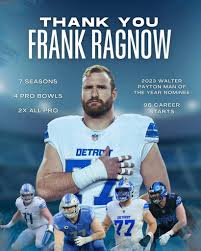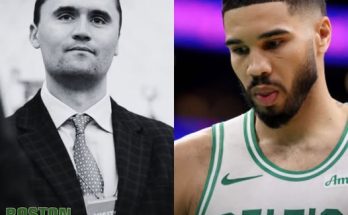Frank Ragnow, the heart and soul of the Detroit Lions’ offensive line, has officially announced his retirement from the NFL after seven grueling, resilient, and impactful seasons. The 28-year-old center, widely regarded as one of the league’s toughest and most technically sound linemen, steps away from the game at a time when his career still appeared to have plenty of mileage left. For the Lions organization, his retirement marks the end of an era defined by quiet leadership, physical dominance, and relentless commitment to excellence.
Drafted 20th overall by the Lions in the first round of the 2018 NFL Draft out of Arkansas, Ragnow was a foundational piece in Detroit’s rebuilding efforts through some of the franchise’s darkest and most promising moments. His career arc mirrors the Lions’ own journey over the past decade—from a team struggling to find an identity, to a formidable contender that finally began to command league-wide respect.
From the moment he arrived in Detroit, Ragnow impressed with his intelligence, physicality, and unshakeable demeanor. He was more than just a great athlete; he was the kind of player coaches build game plans around, someone who could anchor the middle of an offensive line and dictate the pace of play from the trenches. Rarely flashy, often overlooked by national media, Ragnow did the kind of work that doesn’t show up on highlight reels but is essential to winning football.
His seven seasons in the NFL were marked by elite play and unwavering durability—at least early in his career. Ragnow started all 16 games as a rookie and quickly earned the trust of his teammates and coaching staff. He seamlessly transitioned from guard to center, showing not only versatility but a football IQ that separated him from most of his peers. In 2020, Ragnow was named to the Pro Bowl and was a second-team All-Pro, reinforcing his status as one of the premier centers in the NFL.
But for all of his accolades and durability, Ragnow’s career was also marked by pain. Injuries began to pile up in recent seasons, most notably a painful and chronic turf toe injury that nagged at him relentlessly. He played through significant discomfort, often sacrificing his long-term health for the good of the team. That kind of toughness became his trademark. Teammates marveled at his grit, opponents respected his consistency, and coaches knew they could rely on him no matter the stakes or circumstances.
In many ways, Ragnow embodied the gritty spirit of Detroit. He didn’t crave the spotlight. He didn’t make headlines with bold proclamations or flashy off-field antics. He simply went about his work with a blue-collar ethic that perfectly aligned with the city he represented. Every snap, every pancake block, every moment spent battling through pain—all of it contributed to the culture shift that Dan Campbell and Brad Holmes have been so determined to instill within the Lions locker room.
As recently as last season, Ragnow remained a pivotal part of Detroit’s success. The Lions boasted one of the league’s most physical and dominant offensive lines, and much of that credit belonged to the center who kept everything in sync. Whether paving the way for breakout running backs or protecting quarterback Jared Goff with surgical precision, Ragnow was instrumental in the Lions’ playoff push and their emergence as legitimate NFC contenders.
But behind the scenes, the physical toll of the game was mounting. Ragnow had undergone multiple surgeries and admitted publicly that he was playing through significant discomfort. He described his injury situation as “something I just have to manage” but acknowledged that it was affecting not just his performance but his daily quality of life. Even after the Lions made a deep playoff run, the writing was on the wall. The man who gave everything to the game was beginning to consider the cost.
Ultimately, Ragnow chose health and family over prolonging a career that had already demanded so much from him. In his retirement announcement, he thanked his teammates, coaches, and fans, emphasizing how much Detroit had come to mean to him over the years. He spoke candidly about the internal conflict between his competitive fire and the growing awareness that his body could no longer keep up with the demands of the sport at the level he expected of himself.
Reactions poured in from across the league as news of his retirement broke. Lions head coach Dan Campbell called Ragnow “one of the toughest, most selfless players I’ve ever been around.” General manager Brad Holmes praised his leadership and integrity, adding that Ragnow had set a standard for professionalism in the building. Jared Goff said he felt privileged to share the field with a player of Ragnow’s caliber, calling him “a quarterback’s best friend.”
Teammates old and new took to social media to express their gratitude. Penei Sewell, the rising star tackle who lined up beside Ragnow, wrote that he learned more from the veteran center in a year than most players learn in a lifetime. Former Lions running back Jamaal Williams called Ragnow the kind of player you go to battle for, describing him as “the heartbeat of the line.” Across the board, the consensus was clear: Ragnow wasn’t just a great player, he was a beloved teammate and an irreplaceable presence in the locker room.
For the Lions, his departure creates both a void and an opportunity. The team has been building through the trenches and still boasts strong personnel across the offensive line, including Sewell and guard Jonah Jackson. But replacing a center of Ragnow’s caliber won’t be easy. Centers are the cerebral command centers of an offense, responsible for identifying blitzes, calling protections, and maintaining cohesion. Ragnow excelled in those areas, and the Lions will need someone who can approach that level of understanding and execution.
As for Ragnow’s legacy, it is secure. In seven years, he established himself as one of the best at his position and one of the most respected men in the NFL. He never sought recognition but earned it anyway through sheer force of will, a tireless work ethic, and an unshakable sense of loyalty to his team. In an era where many players chase individual glory or leap at the first opportunity to leave a struggling franchise, Ragnow stayed. He believed in the Lions even when wins were scarce. And when success finally came, he was still right there in the middle of the line, doing what he had always done: showing up, doing the dirty work, and leading by example.
Ragnow leaves the game with no regrets. He walks away on his own terms, a rarity in a sport that often decides for its players when their time is up. While fans in Detroit and beyond will undoubtedly miss seeing No. 77 anchoring the offensive line, his decision is a reminder of the human cost behind every snap, every block, every injury.
What comes next for Ragnow remains to be seen. Given his intelligence, leadership, and love for the game, a future in coaching or broadcasting wouldn’t be surprising. But for now, he will return to a life free of the constant pain and pressure of NFL Sundays. He’ll get to enjoy the simple joys of family, health, and a body that no longer has to brace for war every week.
For Detroit, Frank Ragnow was more than a player. He was a culture-setter, a tone-setter, and a symbol of everything the new-look Lions aspire to be. Grit. Heart. Loyalty. Selflessness. His name will one day belong in the team’s Ring of Honor, and his example will continue to shape the next generation of players who wear the Honolulu Blue.
In a city built on resilience, Frank Ragnow fit perfectly. And though his time on the field is done, his impact on the Lions and the game of football will be felt for years to come.



